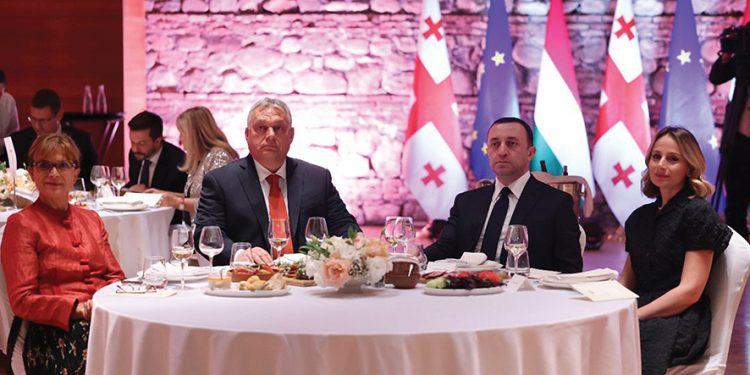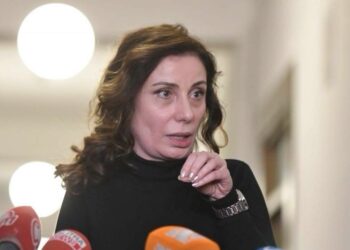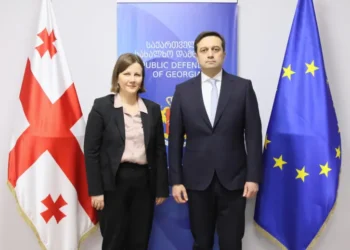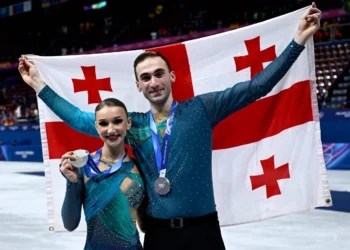On October 9, the Hungarian Prime Minister Viktor Orbán arrived in Georgia with his wife, Aniko Levai, and fellow government members.
The Georgian government announced he would hold a meeting with Prime Minister Irakli Garibashvili, followed by a meeting of the Georgian-Hungarian intergovernmental commission and a “memorandum signing ceremony.”
Orbán informed journalists about his visit last week, claiming he is the most devoted supporter of Georgia’s European integration. The Hungarian PM said he was coming to Georgia to show his support for it.
“It is totally unfair that you are not promised that you will become [an EU member], because you have done a good job. We need you very much,” Orbán told the Georgians.
Asked by a journalist why Georgia was denied candidate status last year, Orbán opined it was because of the “selfishness” of the EU leaders.
“The leaders are selfish. They don’t want to let you in and give you the financial resources you need, which is totally unfair to your country. We have to share what we have, because we need you: you have a strategic position,” he stated.
As part of the official visit, the Hungarian PM held a face-to-face meeting with his Georgian counterpart Irakli Garibashvili. The government administration reported that “The close partnership between Georgia and Hungary was discussed at the meeting.”
Garibashvili noted that cooperation between the countries has moved to a new stage through joint efforts, which includes a regular exchange of visits and expansion of sectoral ties, and the parties had discussed the prospects of deepening fruitful cooperation in various fields.
The Prime Minister claimed that the holding of the intergovernmental summit in Georgia is part of the practical implementation of the declaration on strategic partnership between Georgia and Hungary signed in Budapest.
Speaking about European integration, PM Garibashvili noted that Georgia irreversibly follows the European path. He reviewed the steps taken by the Georgian government on this path, claiming that the government ensured an open, transparent and inclusive process for the implementation of the 12 priorities, and at the end of the year the country is expecting a fair and merit-based decision from the European Union. The Prime Minister thanked Viktor Orbán for his firm support of Georgia’s European integration, and noted that Georgia appreciates “the steadfast support of its friend Hungary on this path.”
The parties summarized the progress achieved in the direction of economic cooperation between the two countries: In 2023, the trade turnover increased by 21% and now amounts to $46.62 million. As the head of the government noted, Georgia and Hungary have great potential for economic cooperation, and it is important to fully utilize the existing opportunities. He stated that Georgia is interested in attracting investments in sectors such as renewable energy, logistics, and tourism.
Garibashvili and Viktor Orbán also discussed the dynamics of the Black Sea submarine electric cable project connecting the Caucasus region and Europe. The Prime Minister noted that the implementation of flagship projects initiated by Georgia is vital for realizing the full potential of energy, and for achieving common goals in the direction of energy security.
Foreign Minister Ilia Darchiashvili noted: “We have strong and positive messages from Hungary and many other EU countries regarding the fact that Georgia deserves candidate status – we have positive expectations.”
He added that the Government of Georgia is working individually with Hungary and other EU member states so that the country has strong support relating to the candidate status.
“We are working individually with all member states, including Hungary, to get their strong support. Our common goal is our European perspective and candidate status. We have strong and positive messages from Hungary and many other EU countries that Georgia deserves candidate status, and I am sure we will get it. Hungary is one of the strongest supporters when it comes to granting status to our country and our country’s successful progress towards the final goal – full membership of the European Union,” Darchiashvili noted.
Darchiashvili also answered a question about the Black Sea cable project.
“Hungary is one of the participants, together with Romania and Azerbaijan, of the agreement, which involves the implementation of the Black Sea electricity cable project, which will make a great contribution to the energy diversification of Europe. All of us are actively involved in the implementation of this project, and this visit also strengthens and proves the fact that we actively continue cooperation,” Darchiashvili said.
To conclude the visit, on October 12, an official dinner was held in honor of the Prime Minister of Hungary and his wife, hosted by the local government.
“I am extremely grateful for the true friendship of Prime Minister Orbán and his government, as well as for the strong support for the aspiration of Georgia and the Georgian people to become a member of the European family,” PM Garibashvili said at the reception, going on to suggest that Prime Minister Orbán “is an exemplary leader and role model politician.”
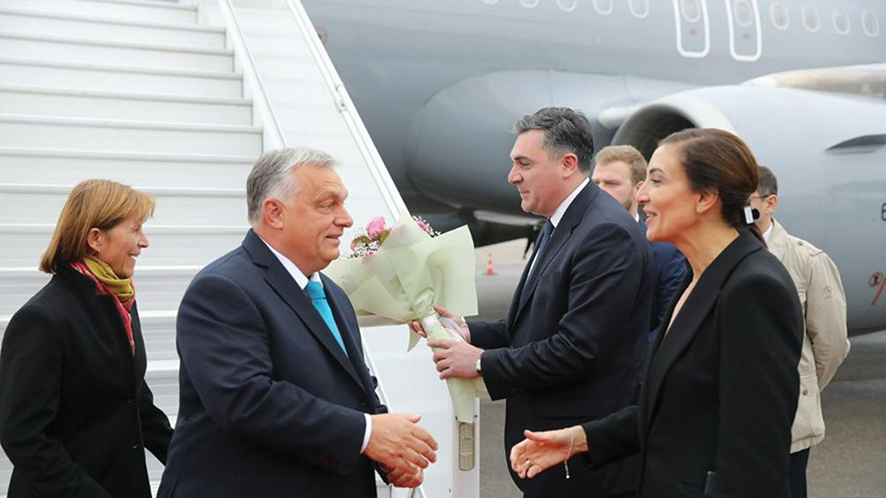
In turn, the Hungarian Prime Minister noted that his visit underscores how important and valuable the relationship is between the two nations.
“We are proud to be invited here by you and your wife,” he told Garibashvili. “It’s always good when I see a couple in politics who not only talk about family values, but also set a great example. The reason for coming to Georgia is to set good examples for Hungarians. So, Irakli, thank you very much for the invitation. We have a long friendship. I hope this visit highlights how important and valuable the relationship is between these two nations.
“In the modern world, there is a discussion about whether miracles exist or not,” Orbán went on. “We Christians think there are, but those who do not yet believe that miracles exist should come into this room tonight, because there are at least two miracles here: First, this is the Georgian miracle – your history, the geopolitical environment of your nation itself: The fact that there are still Georgian people, there is such a language as Georgian and people who live here and speak this language, there is a Georgian state and that this state is still Christian – this is a miracle! The next miracle in this room is Hungarian. As you know, we, Hungarians, came from the Far East, from beyond the Ural Mountains, and occupied the country where we live 1100 years ago. As foreigners, we had neither relatives nor family members around us; we Hungarians were alone. We occupied the territory, we still have the same language, we still perfect the same culture and live our own lives. So it is a miracle that there are still Hungarians who speak Hungarian, that there is a Hungarian state and that this state is Christian – this is the second miracle.
“This is a miracle meeting between the two countries, and I believe that it will not only prepare a political foundation for the relations between the two countries, but also ensure excellent relations between the two countries at a deeper level,” Orbán said.
The opposition, meanwhile, noted its skeptical position regarding Orbán’s visit and of Georgia’s partnership with Hungary in general.
“I don’t think Orbán will be the best mediator for us with other EU states regarding the candidate status – as an ally of Russia, he is quite isolated in the EU today,” Lelo MP Salome Samadashvili told journalists, adding that Orbán is Putin’s ally and the only leader in the European Union who has tried to block aid to Ukraine, as well as sanctions against Russia.
“Orbán is Putin’s main and, I would say, only ally within the EU. You know that Orbán is the only leader in the EU who has tried to block aid to Ukraine, as well as the sanctions against Russia. It is very significant that the ‘Russian Dream’ government has as its only friend in the EU one who is also a friend of Vladimir Putin.
“Yet, the granting of candidate status to Georgia should be decided through a political decision, because the important demands of the EU have not been fulfilled. The report of the Venice Commission confirmed that no reforms were carried out. I don’t think Orbán will be the best mediator for us with other EU states in this decision, considering that he is quite isolated in the EU today as a representative of the government allied with Russia,” she added.
By Ana Dumbadze

